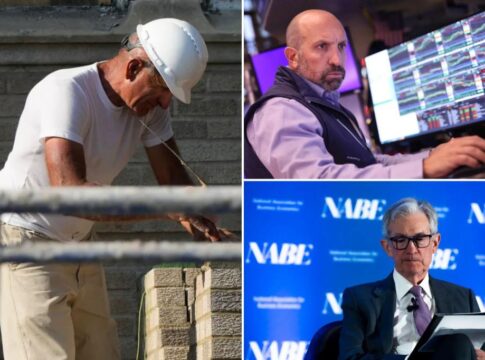An icon in the shape of an angle pointing down.
Photo by Daniel Ceng/Anadolu via Getty Images
- China has ramped up its military presence around Taiwan, the country’s navy commander said.
- Adm. Tang Hua told The Economist that China wants it to make a mistake so it can justify a blockade.
- Experts say China could try to take Taiwan by force within the next few years.
China is trying to force Taiwan into making mistakes and is looking for excuses to trigger a blockade, according to Taiwan’s navy commander.
Adm. Tang Hua told The Economist that China is “slowly, but surely” ramping up its military presence around Taiwan and is ready to blockade Taiwan “at any time they want.”
He described the tactic as an “anaconda” strategy meant to “squeeze the island.”
“They give you extreme pressure, pressure, pressure,” Tang said. “They’re trying to exhaust you.”
At the same time, Tang said that Taiwan is focused on avoiding confrontation. “The PLA is trying to force Taiwan to make mistakes,” he said, using the acronym for China’s People’s Liberation Army.
Concerns about a possible Chinese invasion of Taiwan have grown since Phil Davidson, then the US Indo-Pacific commander, said in 2021 that China could invade Taiwan by 2027.
Since then, military experts and former defense officials have made similar assessments, with variations on the timeline and approach.
Many point to China’s rapid modernization of its armed forces over the past two decades and military drills around Taiwan.
According to recent updates shared by Taiwan’s defense ministry, China’s aircraft, vessels, and ships now operate around Taiwan almost daily, sometimes crossing the median line in the Taiwan Strait and causing its neighbor to scramble its planes.
Experts from the American Enterprise Institute and the Institute for the Study of War said in May that an aggressive Chinese coercion campaign — short of war but still threatening — was more likely than a full-scale invasion.
Even so, in its Global Peace Index 2023, the Institute for Economics and Peace estimated that a Chinese blockade of Taiwan would result in a $2.7 trillion loss in world economic activity in the first year alone, equivalent to a 2.8% decline in global GDP.
Bloomberg’s modeling, meanwhile, estimates that a total blockade of Taiwan and Western sanctions on China could result in a 5% worldwide GDP decline, with US GDP falling by 3.3% and China’s by 8.9%.
Earlier this year, Taiwan’s military leadership issued new rules of engagement around self-defense.
“We restrain our guys, not to provoke or escalate,” Tang told The Economist.
According to an unofficial translation by the Lieber Institute for Law and Land Warfare at West Point, Taiwanese soldiers can launch attacks against a target that is clearly identified as a legitimate military objective and that displays clear hostile acts or intentions, as long as it is in keeping with the nature of the unit, the mission, and the specific tasks assigned by the superior.
Taiwan’s defense minister, Wellington Koo, raised similar concerns last month, telling the Financial Times that it will become harder to spot early signs of a Chinese attack due to China’s growing military activity around the country.
On Monday, as part of the 75th anniversary celebrations of the People’s Republic of China, Chinese leader Xi Jinping pledged to achieve China’s “complete reunification” with Taiwan.
“It is where the greater national interest lies, and it is what the people desire,” he said, adding: “The wheel of history will not be stopped by any individual or any force.”


